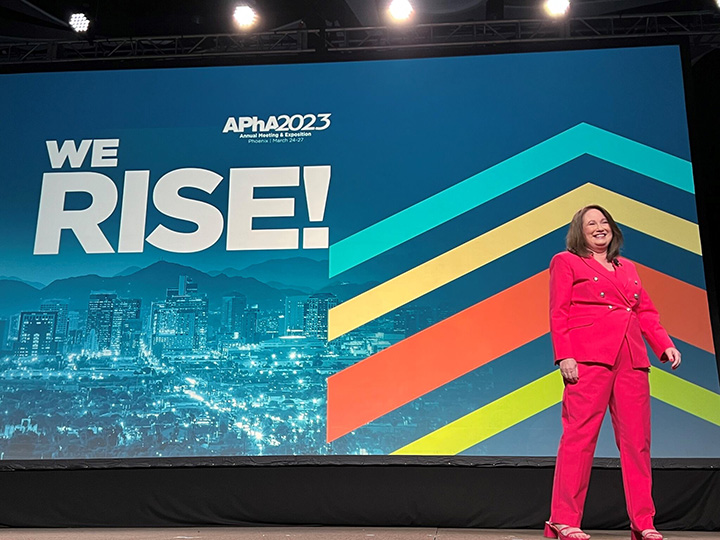
Valerie Prince, professor in Samford University’s McWhorter School of Pharmacy, was appointed 168th president of the American Pharmacists Association (APhA) on Monday, March 27, during the organization’s annual conference in Phoenix, Arizona.
APhA is the nation’s oldest and largest pharmacy organization, leading the profession and equipping members for their role as medication experts in team-based, patient-centered care.
Prince is no stranger to the organization, having first become involved with APhA as a first-year pharmacy student, during which time she held her first office. She remained in student APhA leadership for all four years of pharmacy school, after which she tracked directly into leadership in APhA’s Academy of Pharmacy Practice and Management, including terms as president and speaker of the house of delegates.
After her year as speaker, Prince retired from professional organization leadership to spend more time with her daughters as they moved through middle and high school. But 10 years later, she found herself in the running for APhA president.
“And since my daughters both graduated from high school, I did it, and here I am,” she said.
First, however, Prince served for a year as president-elect, during which time she chaired APhA’s Strategic Directions Committee.
“In addition to following the traditional processes to create and update our strategic plan, my committee spent a significant amount of time evaluating the process itself,” she said. “We landed on a plan based on some different philosophies and concepts/processes, and that plan will be followed in the coming year. Most importantly, though, I’ve taken the opportunity to watch and learn from the (immediate past) president, Theresa Tolle.”
Now, as president, Prince looks forward applying her life and leadership experiences to facilitate pharmacists’ ability to serve their patients.
“There are so many moving parts encompassed in that simple statement,” she said. “Pharmacists’ authority to provide services critical to public health, such as COVID tests, treatment and vaccinations, reimbursement for services to keep the pharmacy doors open, pharmacists’ working conditions, strengthening interdisciplinary and interprofessional relationships are just a few of these moving parts.”
But at the core of it, Prince said it comes down to “helping patients.”
“There are so many different ways pharmacists help patients both directly and indirectly,” she said. “The same degree and license gives you the ability to function in vastly different capacities. For example, a pharmacist who works in industry might be involved in helping patients indirectly through research and development of new drugs. Pharmacists also help patients directly through many practice settings, such as community, hospital, long-term care, nuclear, etc. Pharmacy is a ‘helping patients’ profession.”
